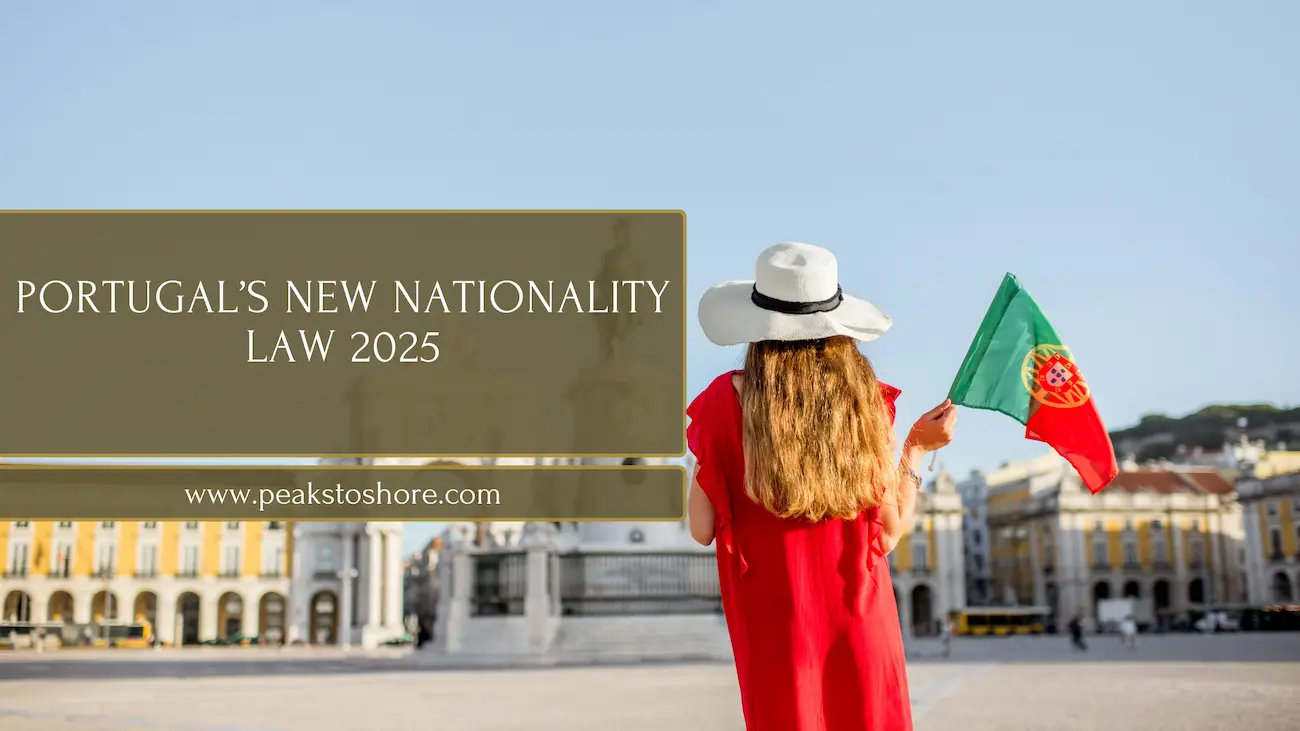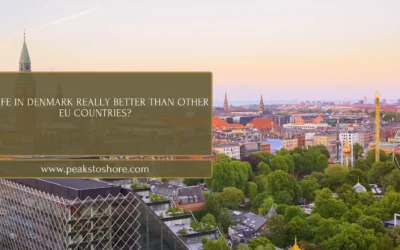A significant change is unfolding for expats dreaming of calling Portugal home. The Portuguese government has introduced a new nationality law, reshaping the path to citizenship for foreigners. This update, driven by efforts to manage immigration and integration, has sparked discussions among expats, digital nomads, and investors who’ve long been drawn to Portugal’s sunny climate, affordable living, and welcoming vibe.
This post breaks down the key changes to Portugal’s nationality law in 2025, exploring what they mean for those living in or planning to move to the country. With shifts in residency requirements, eligibility criteria, and integration expectations, understanding these updates is crucial for anyone eyeing Portuguese citizenship. We’ll cover the details, practical implications, and tips to navigate this new landscape, all while keeping an eye on the evolving nature of these reforms. Let’s dive into what expats need to know about securing Portuguese nationality in 2025.
Key Changes to the Nationality Law
Extended Residency Requirements
The most notable change is the extension of the minimum residency period required for naturalization. Previously, most applicants needed five years of legal residence with a valid permit. Under the new law, this has been doubled to ten years for the majority of foreigners, reflecting a push for longer-term integration. However, exceptions apply: citizens from Portuguese-speaking countries (e.g., Brazil, Angola, Mozambique) face a seven-year requirement, acknowledging linguistic and cultural ties.
This shift aims to ensure deeper community ties, but its implementation is still being clarified. Some sources suggest the change took effect earlier this year, while others indicate ongoing debates, meaning the exact start date may vary. Expats should monitor official updates from the Portuguese government or AIMA for confirmation.
Stricter Eligibility for Children
Another significant adjustment affects children born in Portugal to foreign parents. Under the previous law, these children could claim citizenship if one parent had legally resided in Portugal for two years. The new rules tighten this, requiring at least five years of parental residency—or potentially more, depending on further refinements—before eligibility kicks in. Additionally, automatic citizenship for children born on Portuguese soil to non-residents has been eliminated, aligning with stricter integration goals.
This change has raised concerns among expat families, as it may delay citizenship for the next generation. The policy’s intent is to prioritize long-term commitment, but its impact on mixed-nationality households remains under scrutiny.
Enhanced Integration Criteria
The new law introduces stricter integration requirements, moving beyond residency time. Applicants must now demonstrate familiarity with Portuguese culture, history, and democratic values, potentially through tests or interviews. Language proficiency remains a cornerstone, with a B1 (intermediate) level of Portuguese required, assessed via recognized exams like the CAPLE test.
Other criteria include a clean criminal record and evidence of economic self-sufficiency—proof of stable income or employment. These measures aim to ensure newcomers contribute positively to society, though the exact evaluation process is still being defined, leaving some ambiguity for applicants.
Revocation and Residency Mandates
A controversial addition allows citizenship revocation for severe crimes committed after naturalization, a departure from Portugal’s traditionally lenient stance. This applies to acts threatening national security or public order, though specifics on what qualifies are pending.
Additionally, a residence visa is now mandatory for citizenship applications, ending the practice of using tourist visas or visa exemptions as a starting point. This shift requires expats to secure a legal residency permit—such as the D7 visa or Golden Visa—before beginning the citizenship clock, adding a layer of planning for newcomers.
Implications for Expats
Longer Wait Times
The jump from five to ten years (or seven for lusophone countries) means expats must plan for a longer commitment. For digital nomads on short-term visas or retirees on the D7, this could delay citizenship aspirations, especially if residency gaps occur. Those already in Portugal with five years of residence might still qualify under transitional rules, but this is not yet confirmed—checking with AIMA is essential.
This extended timeline may deter some, but it could also encourage deeper roots, with more time to learn the language and culture.
Impact on Families
For expat families, the tightened rules for children pose challenges. A child born in 2025 to parents with less than five years of residency won’t automatically qualify, requiring parents to maintain legal status longer. This could affect schooling or inheritance plans, as non-citizen children may face visa restrictions later. Families should consider dual applications or language support to meet future requirements.
Work and Integration Pressures
The integration criteria add pressure for working expats. Professionals in English-speaking roles (e.g., tech or academia) might find the B1 Portuguese requirement daunting, especially if their job doesn’t demand the language. Small business owners or those in customer-facing roles may need to upskill quickly to meet cultural and linguistic expectations.
Economic self-sufficiency adds another hurdle. Expats on passive income (e.g., D7 visa holders) must prove financial stability, potentially requiring detailed documentation. This could exclude those with irregular earnings, pushing them toward employment or investment options.
Visa Strategy Adjustments
The mandate for a residence visa shifts the citizenship process. Expats entering on a 90-day Schengen tourist visa can no longer use this time toward residency, requiring an immediate switch to a permit like the D2 (entrepreneur) or D7 (retirement) visa. This necessitates upfront costs—D7 applications start at €5,000 plus legal fees—and compliance with renewal rules to avoid gaps in the ten-year clock.
Practical Steps for Expats
Understanding Eligibility
- Residency Tracking: Maintain a continuous legal residency record. Use the AIMA portal or consult an immigration lawyer to ensure no breaks occur.
- Family Planning: If you have children, document parental residency from birth to meet the new five-year threshold. Consider dual citizenship options if one parent is Portuguese.
- Background Check: Ensure a clean criminal record, as revocation risks are now a factor. Obtain a police certificate from your home country if needed.
Meeting Integration Requirements
- Language Learning: Enroll in Portuguese courses (e.g., via Instituto Camões or private tutors, starting at €10/hour) to reach B1 level. Online platforms like italki offer flexible options.
- Cultural Education: Study Portuguese history and values—resources like Visit Portugal provide cultural insights. Prepare for potential tests with sample questions from immigration forums.
- Financial Proof: Gather bank statements, tax returns, or employment contracts showing €820/month (2025 minimum income threshold) to demonstrate self-sufficiency.
Navigating the Application Process
- Secure a Visa: Apply for a residence permit (e.g., D7 or Golden Visa) via AIMA. Processing takes 3–6 months, so plan ahead.
- Legal Support: Hire an immigration lawyer (€500–€1,000) to navigate updates and ensure compliance, especially with new revocation clauses.
- Monitor Changes: Check Portugal Resident or official government announcements for the latest on transitional rules or test formats.
Tips for Living in Portugal During the Transition
Budgeting for Residency
- Visa Costs: Budget €5,000–€10,000 for initial D7 or Golden Visa applications, including fees and legal advice. Renewals cost €500–€1,000 annually.
- Housing: Rent a one-bedroom apartment in Lisbon (€550–€700) or Porto (€400–€600) to stay within budget while building residency.
- Living Expenses: Plan for €800–€1,200/month (rent, utilities €100, groceries €200, transport €40) to meet self-sufficiency rules.
Building a Support Network
- Expat Communities: Join groups on Facebook or Meetup for advice and support from others navigating the new law.
- Language Exchange: Partner with locals via Tandem or local events to improve Portuguese and meet integration goals.
- Professional Networks: Attend industry events in Lisbon or Porto to connect with English-speaking employers who may support your citizenship journey.
Staying Updated
- News Sources: Follow The Portugal News or government portals for real-time updates on the law’s rollout.
- Legal Advice: Consult firms like Belion Partners for tailored guidance as regulations evolve.
- Community Feedback: Engage with expat forums to share experiences and clarify ambiguities in the new requirements.
FAQs: Portugal’s New Nationality Law for Expats
Q: When does the new law take effect?
The changes are reported to have started in 2025, with some sources citing early implementation and others ongoing debates. Official confirmation from AIMA or the Portuguese government is needed, as the timeline remains fluid.
Q: Can I still apply under the old five-year rule?
Possibly, if you’ve already completed five years of residency by 2025. Transitional provisions are rumored but not finalized—check with AIMA or an immigration lawyer for your case.
Q: What if I don’t speak Portuguese yet?
The B1 level is mandatory. Start learning now with courses or apps—reaching it in two years is feasible with consistent effort (5–10 hours/week).
Q: How does this affect my D7 or Golden Visa?
These visas remain valid for residency, but the ten-year clock starts only with a permit, not a tourist visa. Ensure continuous renewals to qualify.
Q: What happens if I commit a crime after citizenship?
Severe crimes (e.g., terrorism) could lead to revocation, a new risk. Maintain a clean record and seek legal advice if issues arise.
Final Thoughts: Adapting to a New Era
Portugal’s new nationality law marks a turning point for expats. The extended residency, stricter eligibility, and integration demands reflect a shift toward long-term commitment, challenging the easy path to citizenship of the past. Yet, with careful planning—securing a visa, learning Portuguese, and building a stable life—expats can still make Portugal home.
What about you?
- Are you planning to pursue Portuguese citizenship under the new law?
- What challenges or opportunities do you see in these changes?
- Have you started preparing for the B1 requirement or residency tracking?
Share your thoughts in the comments—we’d love to hear your plans! Or pass this along to an expat friend navigating Portugal’s updates. Stay tuned for more insights on expat life and travel across Europe. Let’s keep adapting and thriving together!
—
🔗 More posts from Peaks to Shore:






0 Comments